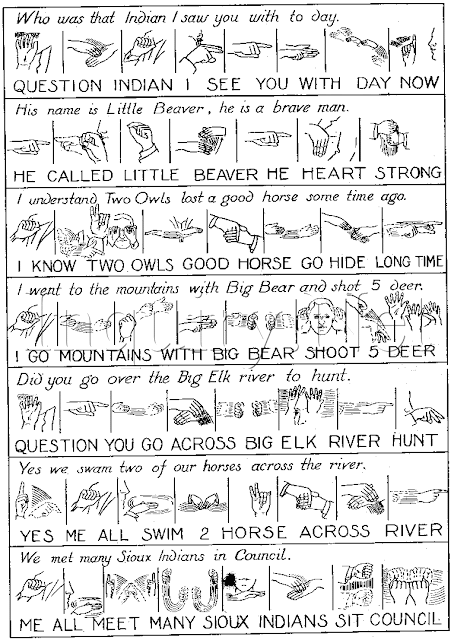Although Lewis and Clark included on their journey interpreters like Touissant & Sacagawea Charbonneau, their command of the indigenous languages was limited mostly to that of the tribes along the Missouri river and, west of that, the Shoshone tribes from which Sacagawea hailed. That left a lot of territory to cross without the assist of a common spoken language and - the Native Americans of the day being pre-literate - of course no written language whatsoever. Pretty anxiety producing when you consider the expedition departed in full expectation of a future reliant on distant, as-yet-unknown natives for food, horses, and navigation, if you ask me.
So something really interesting to be discovered in reading the The Journals of Lewis and Clark is that evidently, although this great land of America was originally inhabited by hundreds of indigenous tribes each speaking its own tongue or dialect thereof, chaos did not actually reign: the Indians had a sort of lingua franca of their own, and that was sign language.
As the expedition moved westward, approaching the Continental Divide, Lewis writes in his journal for Wednesday, August 14th, 1805:
"The means I had of commicating with these people was by way of Drewyer who understood perfectly the common language of jesticulation or signs which seems to be universally understood by all the Nations we have yet seen. it is true that this language is imperfect and liable to error but is much less so than would be expected. the strong parts of the ideas are seldom mistaken."Well, a big relief for Lewis and Clark, I should think. (And speaking of communications, notice how Lewis' writing style is closer to modern usage than that of his contemporary, Clark. Lewis is definitely the easier to read, and the more prolific of the two, though both bring something different and worthwhile to the journals.)
In August of 1805, Lewis and Clark were anxious to forge relations with the indigenous tribes - especially as securing horses for portage across the mountains was essential to the expedition's success and those horses were going to come from the Indians. Here's an interesting narrative from August 11th that touches on the use of signs - or failing that, bribes - in making friends and influencing people (or otherwise, letting 'em know you're "white, uptight and outta sight"!). It should be noted that at this point in their journey the group is dressed almost entirely in animal skins and moccasins, a bi-product of their hunt-as-you-go lifestyle and far more durable for the rigours of crossing the wild. Lewis is afraid they'll be ignored as just another party of natives...
"I was overjoyed at the sight of this stranger and had no doubt of obtaining a friendly introduction to his nation provided I could get near enough to him to convince him of our being whitemen. I therefore proceeded towards him at my usual pace. when I had arrived within a mile he made a halt which I did also and unloosing my blanket from my pack, I made him the signal of friendship known to the Indians of the Rocky mountains and those of the Missouri, which is by holding the mantle of robe in your hands at two corners and then throwing [it] up in the air higher than the head bringing it to the earth as if in the act of spreading it. thus repeating three times. this signal of the robe has arrisen from a custom among all those nations of spreading a robe or skin for ther gests to set on when they are visited. this signal had not the desired effect, he still kept his position and seemed to view Drewyer an[d] Sheilds who were now coming in sight on either hand with an air of suspicion. I would willingly have made them halt but they were too far distant to hear me and I feared to make any signal to them least it should increase the suspicion in the mind of the Indian in our having some unfriendly design upon him. I therefore hastened to take out of my sack some b[e]ads a looking glas and a few trinkets which I had brought with me for this purpose and leaving my gun and pouch with McNeal advanced unarmed towards him. he remained in the same stedfast poisture until I arrived 200 paces of him when he turn[ed] his ho[r]se about and began to move off slowly from me; I now called to him in as loud a voice as I could command repeating the word tab-ba-bone, which in their language signifiyes white-man. but lo[o]king over his shoulder he still kept his eye on Drewyer and Sheilds who wer still advancing neither of them haveing sagacity enough to recollect the impropriety of advancing when they saw me thus in parlay with the Indian."Unfortunately for Lewis, as the narrative progresses, apparently the lure of trinkets and the company of the great tab-ba-bone is simply not enough to keep a no doubt fairly freaked-out Indian from getting spooked by the group of armed men approaching him. He gallops away on his horse. Writes Lewis later, "I now felt quite as much mortification and disappointment as I had pleasure and expectation at the first sight of this indian. I fe[l]t soarly chagrined at the conduct of the men particularly Sheilds to whom I principally attributed this failure in obtaining an introduction to the natives." Chin up, Lewis: An adventurous guy like you is sure to make friends!


No comments:
Post a Comment